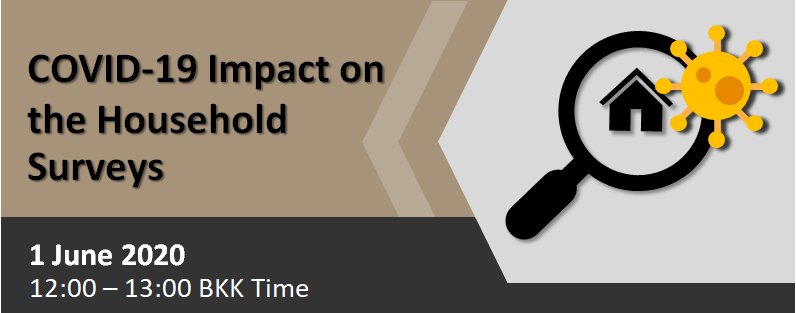
The restrictions imposed by many countries in the world to combat the COVID-19 have presented huge challenges to data collection operations, particularly to household-based surveys when there is a massive increase in demand for information, including socio-economic impact of COVID-19.
The ILO, UNESCAP, and UNICEF are collaborating to organize this Stats Café session aiming to introduce existing guidelines to maintain data collection procedures, shed light on some practical aspects of mixing data collection modes and provide a platform for countries in the Asia-Pacific region to exchange their expertise and learn from each other.
This Stats Café session will cover:
- Surveys under lockdown: mixed mode designs and quality issues;
- Case of labour force surveys: current ILO guidance;
- MICS-PLUS under Pandemic situation;
- Q&A, discussions and way forward.
Moderator: Gemma Van Halderen, Director of Statistics Division in ESCAP
Panelists:
- Kieran Walsh, Senior Statistician, ILO Department of Statistics
- Jayachandran Vasudevan (Jay), Regional Statistics and Monitoring Specialist and MICS coordinator, UNICEF East Asia and the Pacific Regional Office
- Arman Bidarbakht Nia, head of Statistical Data Management Unit, UNESCAP-Statistics Division
Date: 1 June 2020,
Time: 12:00 – 13:00 Bangkok time.
Please register for the Asia-Pacific Stats Café Series Here and join at Microsoft Teams Meeting

ESCAP Statistics Division is pleased to welcome you to the Asia-Pacific Stats Café. The Stats Café series responds to country requests for advice, assistance and an opportunity to share experiences related to the impact of COVID-19 on National Statistical Systems.
The Stats Café will be virtual only, in English and open to you all. Numbers are not limited and travel is not required. Each Stats Café session will comprise a webinar and minimum of 15 minutes questions and answer.
For our first Stats Café, we are honored to collaborate with World Pop and Esri on the topic of “Accessing and using subnational population statistics in Asia and the Pacific”.
Chair: Gemma Van Halderen, Director, Statistics Division, UNESCAP
Panelists:
- Petra Nahmias, Chief, Population and Social Statistics Section, UNESCAP
- Alessandro Sorichetta, Associate Professor, WorldPop Project, University of Southampton
- Maksym Bondarenko, Head of WorldPop Spatial Data Infrastructure, WorldPop Project, University of Southampton
- Linda Peters, Global Business Development Manager for Official Statistics, Esri
Q&A Moderator:
- Petra Nahmias, Chief, Population and Social Statistics Section, UNESCAP
Date: Wednesday, 27 May 2020
Time: 12.00 p.m. (Bangkok time), 22.00 (PDT – May 26), 6.00(BST), 7.00 (CEST), 10.30 (IST), 12.00 (ICT), 15.00 (AEST), 17.00 (FJT)
Watch the recording here.

The Bureau of the ESCAP Committee on Statistics has endorsed the Terms of Reference of the pilot Data Integration Community of Practice. The Bureau met on 15 May 2020 and was advised over 100 members had joined the Community of Practice from 19 countries, and regional and international bodies and were meeting virtually on a weekly basis to review Guidelines on Data Integration developed by UNECE for their relevance to Asia and the Pacific.
A report of the pilot Data Integration Community of Practice will be presented to the 7th session of the Committee on Statistics organized for late August. If the pilot is successful, the Committee on Statistics may decide to expand use of the Community of Practice as a new modality to enhance the functionality and efficiency of existing regional working groups.

First weekly team meeting of the Asia and the Pacific Data Integration Community of Practice (DI-CoP) was organized on Tuesday 12 May 2020, with around 30 participants from four countries plus ESCAP, The Pacific Community (SPC), UNICEF, and UNSD.
In this meeting Ms. Afsaneh Yazdani reviewed objectives of the DI-CoP and explained how different tasks of members assist achieving the objectives. Then Ms. Jessica Gardner presented a report on users’ activities since the launch of the DI-CoP on 23 April 2020. The report showed members have started using the platform, though contribution is still very limited. Finally, Mr. Alick Nyasulu introduced work arrangements; being agreed by meeting attendees.
Members were encouraged to accelerate their contributions by:
- Volunteering to review sections of guidelines
- Volunteering to have presentation on relevant experience at weekly team meetings
- Taking welcome survey
- Updating profiles
Meeting notes, presentation and video are now available here.

The ESCAP Newsletter reflected the launch of the Asia and the Pacific Data Integration Community of Practice in its May 2020 issue.
This highlights the importance of this Community of Practice as a new approach to enhance communication and collaboration among experts with a shared passion for “data integration for better official statistics”.
The community will only grow if receives insights and inputs from its members. Let your contributions add value to it.
Powered by a free Atlassian Confluence Community License granted to https://www.atlassian.com/software/views/community-license-request. Evaluate Confluence today.
- Kolekti ThemeBuilder Powered by Atlassian Confluence 8.5.9
- Kolekti ThemeBuilder printed.by.atlassian.confluence
- Report a bug
- Atlassian News